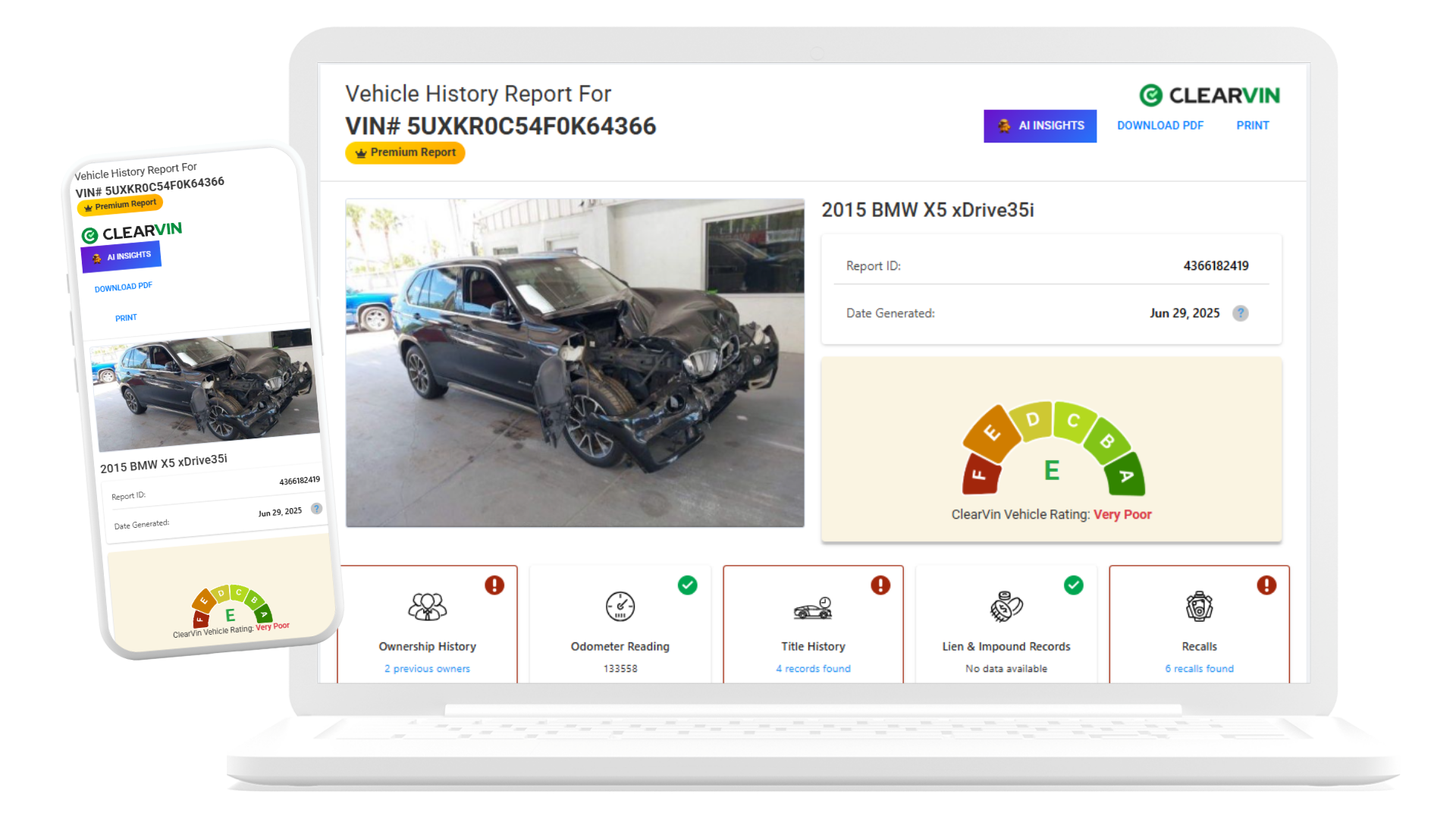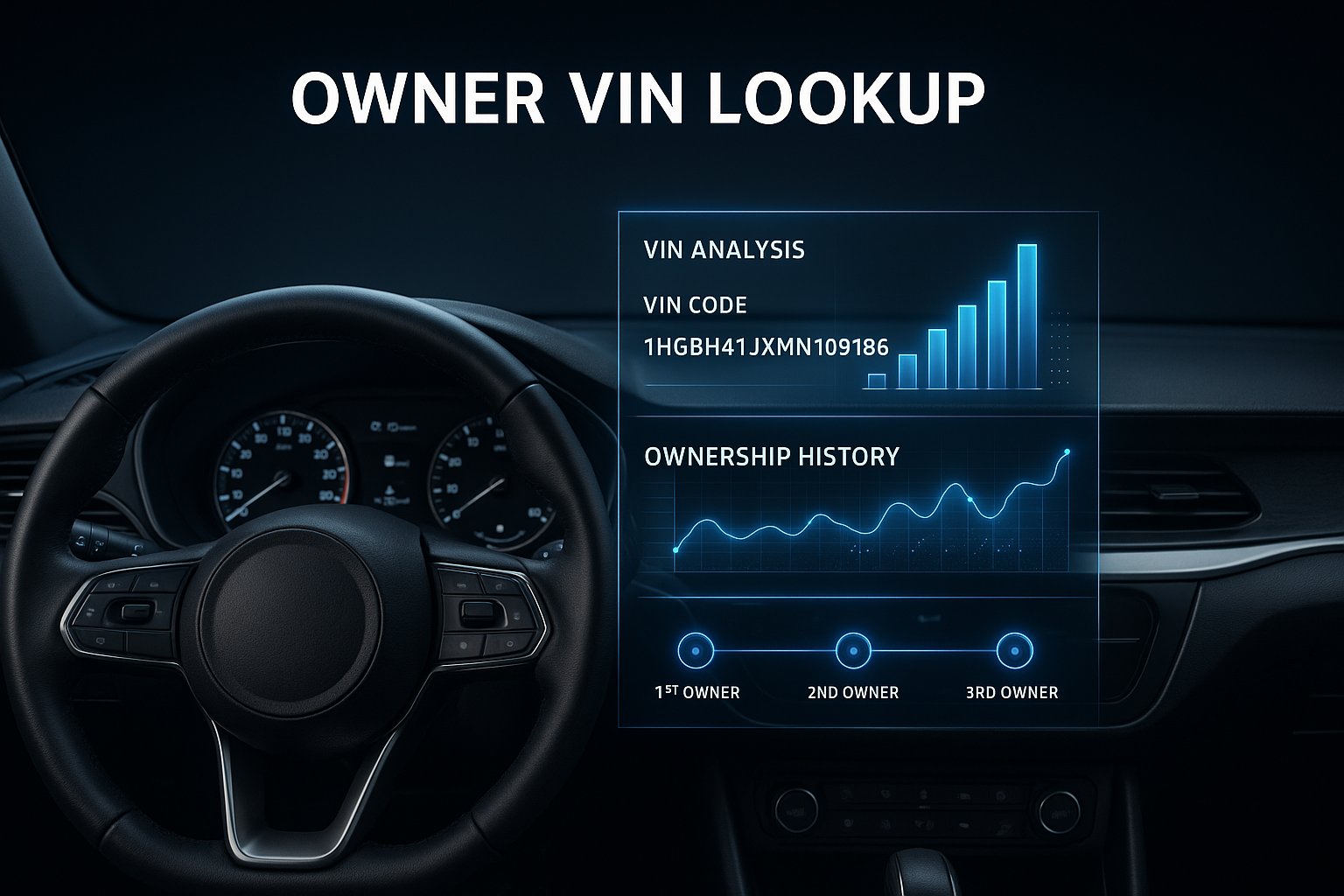
Owner VIN Lookup: How to Find Vehicle Ownership History free
Maybe you’ve wondered what it means to do an owner VIN lookup. It’s actually pretty simple: you take a car’s VIN number and you can find out some important things about it. You won’t see the owner’s name or address (the law doesn’t allow that), but you will see useful stuff like how many people owned the car before, what kind of title it has (clean, damaged, rebuilt), and which states it’s been registered in. With VINspectorAI it’s even easier, because it uses artificial intelligence to analyze the data and show you clearly if the car is worth it or not.
What is an Owner VIN Lookup?
An owner VIN lookup or vehicle owner VIN lookup isn’t just about car specs — it’s about uncovering a car’s ownership history. Unlike a regular VIN decoder that tells you the year, model, or engine type, this process reveals how many people have owned the car, whether it has had a clean, salvage, or rebuilt title, and even where it was registered.
Think of it like checking the biography of a car. A VIN decoder is like looking at its ID card, while an owner lookup is like reading its life story — showing every hand it has passed through and every big event (like accidents or title changes). For buyers, this makes the difference between a smart purchase and an expensive mistake.
How is Owner VIN Lookup Different from a Regular VIN Check?
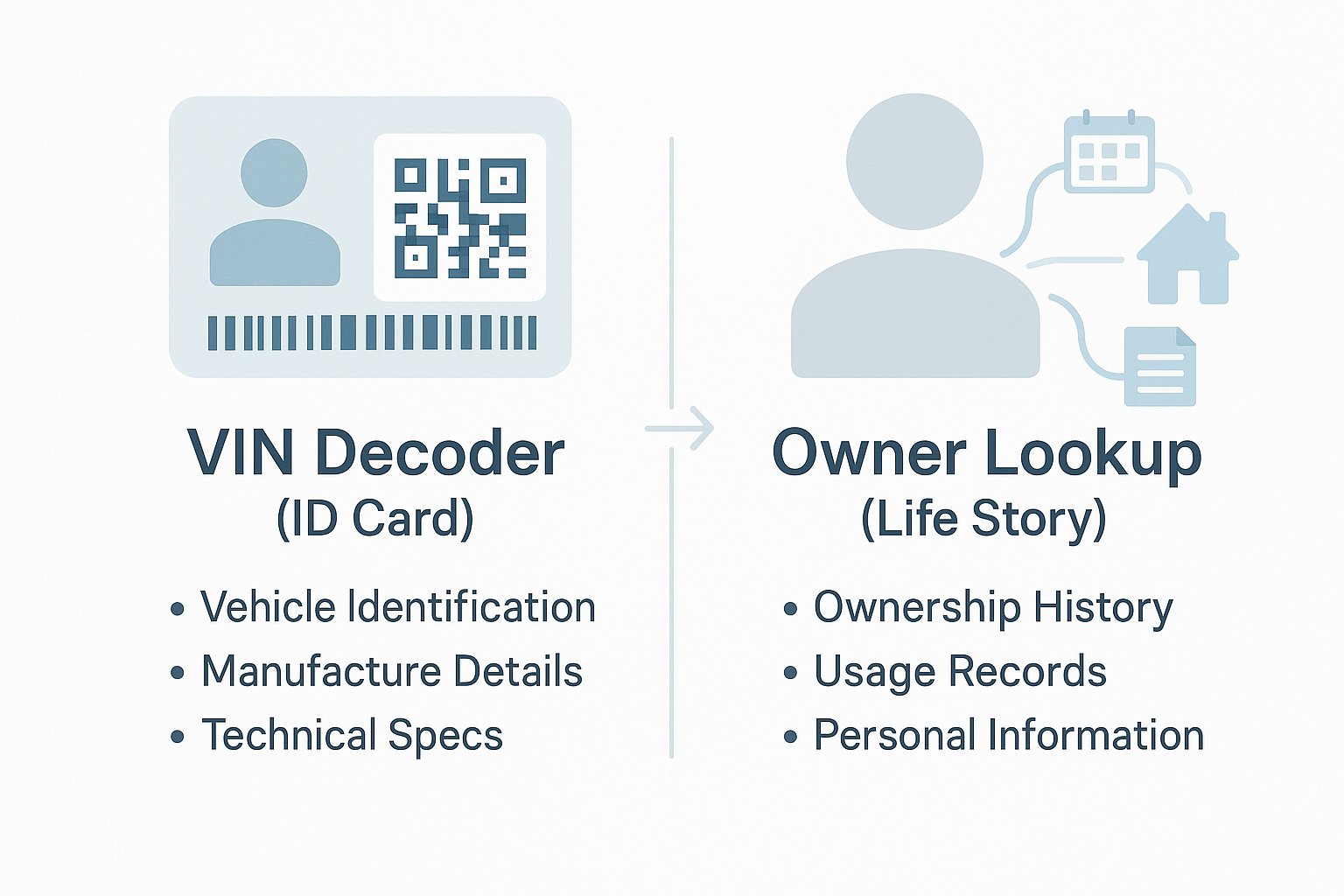
A regular VIN check is like looking at the car’s ID card — you see the basics like model, year, and engine. An owner VIN lookup is more like a file with the car’s full story: how many owners it had and if it was moved between different states.
Why Does Ownership History Matter?
It really matters to know how many owners a car had. If there was just one, chances are it was taken care of pretty well. If there were many, it could mean the car had problems and people wanted to sell it quickly.
Can You Look Up a Car Owner by VIN Number?
Many people search can you look up a car owner by VIN number or owner lookup by VIN number. The answer: yes, but with limits. U.S. privacy laws, especially the Driver’s Privacy Protection Act (DPPA), prevent personal information (like names and addresses) from being shared.
What you can see includes:
The total number of owners.
Title types (clean, salvage, rebuilt).
Transfers across different states.
It’s important to know that many “free VIN owner” websites promising names and phone numbers are scams. A legal VIN owner lookup focuses on ownership history and risks, not personal identity.
Step-by-Step Guide — How to Do an Owner VIN Lookup
A quick owner lookup by VIN is easy if you follow a clear checklist. This step-by-step will help you get reliable vehicle ownership history without wasting time.
Step 1 — Locate the VIN
Find the 17-character VIN on the lower windshield (driver side), driver-door jamb sticker, title/registration, or insurance card.
Tip: VINs never use the letters I, O, Q. If you see one, you copied it wrong.
Step 2 — Verify the VIN
Count 17 characters and remove spaces.
Optional: run a basic VIN decoder to confirm year/make/model/trim before you buy a full report.
Step 3 — Choose the right tool (Free vs Paid)
Free VIN checks = quick identity/recall glance only.
Paid VIN owner lookup service (e.g., VINspectorAI) = full previous owner VIN lookup, title brands, transfers, accidents, mileage signals.
Step 4 — Run the search & confirm identity
Paste the VIN, then confirm the basics match the car (year, trim, engine).
Mismatches = walk away or recheck the VIN.
Step 5 — Read the Ownership History
Look for owner count, ownership dates, and duration with each owner.
Fewer, longer ownership periods generally = better care.
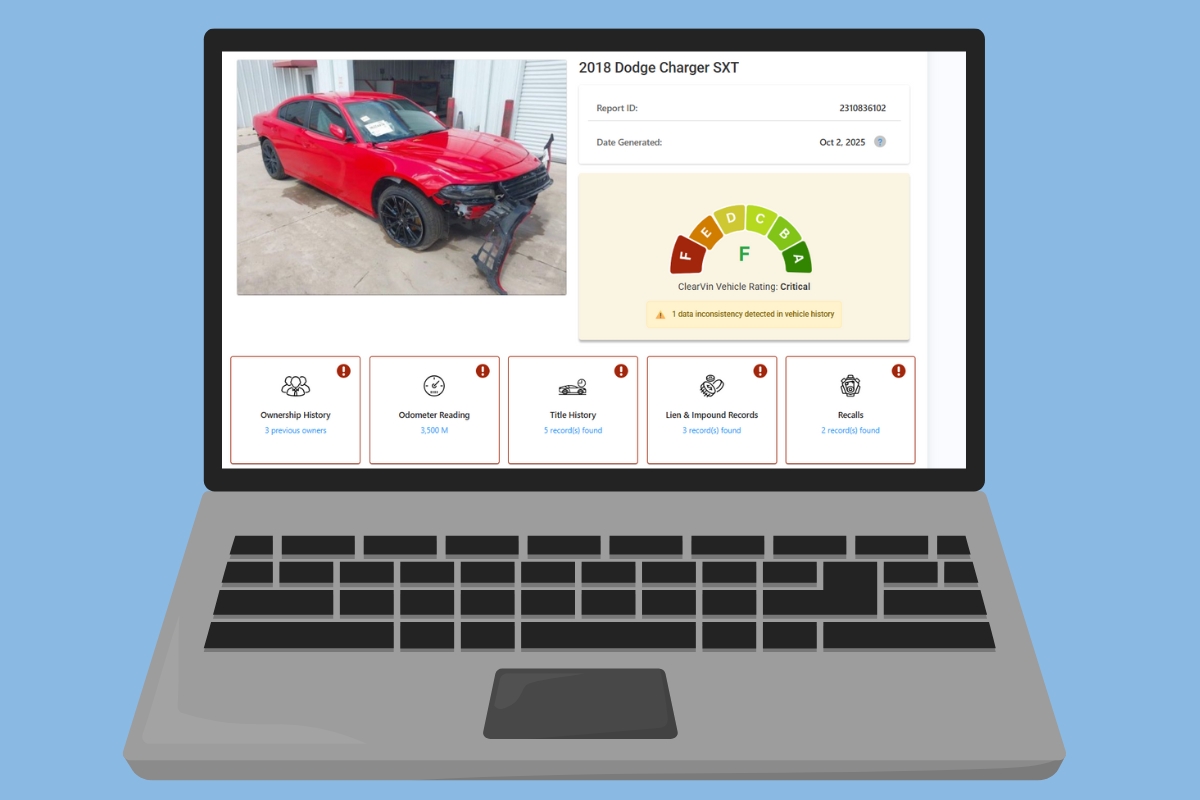
Step 6 — Review Title History
Check for Clean / Salvage / Rebuilt / Lemon / Flood / Buyback brands and any active liens.
Salvage/rebuilt often means higher insurance and lower resale value.
Step 7 — Check State Transfers & Geography
Note each state where the car was registered.
Many fast state changes can indicate title washing.
Extra caution if history includes flood-prone areas (e.g., coastal hurricanes).
Step 8 — Validate Mileage & Service Patterns
Scan for odometer rollbacks or big mileage jumps.
Look for consistent maintenance (oil, brakes, timing belt, emissions/inspection logs).
Step 9 — Weigh AI Risk Signals (VINspectorAI)
Use AI insights to highlight patterns (e.g., “4 owners in 6 years + salvage in TX + mileage anomaly”).
Treat “High Risk” flags as negotiation leverage or a reason to walk.
Step 10 — Save, Question, Decide
Save/print the report for your records.
Ask the seller to explain any red flags (salvage, short ownerships, gaps).
Next steps: independent pre-purchase inspection, thorough test drive, and insurance quote check before you commit.
Free vs Paid Owner Lookup by VIN
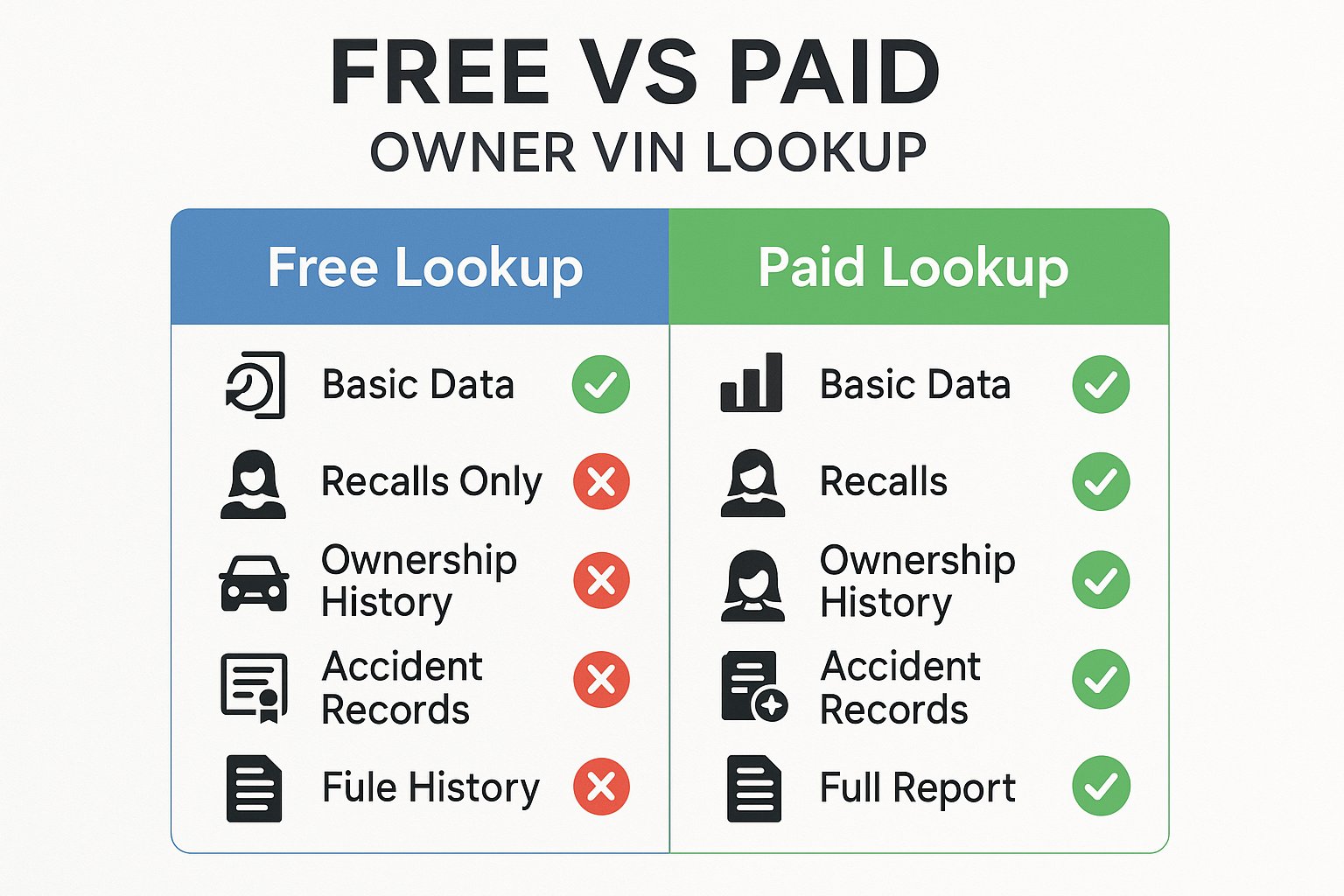
When buying a used car, knowing the vehicle ownership history can save you from costly mistakes. An owner lookup by VIN reveals key details about a car’s past — including the number of previous owners, accident history, and title status. Buyers usually face two choices: a free owner lookup by VIN number or a paid owner lookup by VIN service.
A free VIN owner lookup provides only limited details, such as basic ownership information, manufacturer recalls, and sometimes title brand alerts. While this can help with quick verification, it doesn’t always show the full picture.
On the other hand, a paid owner lookup by VIN service offers a complete vehicle history report that includes previous owners, detailed accident records, maintenance logs, salvage or rebuilt titles, and even state-to-state transfers. This makes it much more reliable for major purchase decisions.
The choice between a free vs paid owner lookup by VIN depends on your needs and budget. Free options are fine for fast checks, but when investing thousands of dollars in a car, a detailed report from a premium provider like VINspectorAI is often the safer choice.
Key Takeaways
✅ Free owner lookup by VIN tools give only basic ownership and recall information.
✅ Paid owner lookup by VIN services provide detailed vehicle ownership history with accidents, titles, and maintenance records.
✅ Both free and paid options confirm vehicle identification, but the best VIN lookup service depends on how much detail you need and your budget.
Free vs Paid Owner Lookup — Comparison Table
Feature | Free Owner Lookup by VIN | Paid Owner Lookup by VIN |
|---|---|---|
Data Sources | Basic manufacturer + recall databases | Official DMV, NMVTIS, insurance, auctions |
Ownership Info | ❌ Not available | ✅ Shows number of previous owners + transfers |
Title History | Limited brand alerts only | Full details (clean, salvage, rebuilt, flood, lemon) |
Accident Records | ❌ Not included | ✅ Comprehensive accident + damage history |
Cost | Free (but very limited) | Paid, but affordable and detailed |
Vehicle Owner VIN Lookup: What You Can Find
A vehicle owner VIN lookup isn’t just about numbers or technical specs — it’s about uncovering the real story behind a car. For anyone thinking about buying a used car, this kind of lookup can mean the difference between making a smart choice and ending up with a vehicle full of hidden problems.
Ownership History (Previous Owners, Transfers)
One of the most important things you’ll see is how many people owned the car before you. Why does this matter? A car with only one or two owners is usually better maintained — there’s a higher chance that it has a complete service history, fewer accidents, and less wear from careless drivers.
On the other hand, if a vehicle has gone through five, six, or more owners in just a few years, that could be a red flag. Frequent changes of ownership may suggest the car had mechanical problems, hidden damage, or that previous buyers weren’t satisfied and wanted to sell it quickly.
A proper owner lookup also shows transfer patterns — for example, if the car kept changing states or was sold multiple times in short periods. This gives you extra clues about how stable (or unstable) its history is.
Title History (Clean, Salvage, Rebuilt)
A VIN lookup also reveals the title history of the car — basically, the legal “status” of the vehicle.
Clean Title → means the car has not been branded as a total loss and is considered roadworthy.
Salvage Title → given when the car has been severely damaged (for example in a crash or flood) and declared a total loss by an insurance company.
Rebuilt Title → when a previously salvaged car has been repaired and put back on the road.
Knowing the title history is crucial, because some sellers might try to hide a salvage or rebuilt status to sell the car for more than it’s worth. Buying a car with a salvage or rebuilt title is risky — insurance can be more expensive, resale value drops, and unexpected repairs are common.
State Transfers and Registration Records
Another key piece of info is where the car has been registered over its lifetime.
If the vehicle has stayed in the same state with the same owner for many years, that’s usually a good sign. It suggests stability and transparency. But if the car has been registered in three or four different states in a short time, that can mean trouble.
Why? Because of something called “title washing.” This happens when someone moves a car with a salvage or flood-damaged title to another state where the rules are looser, and the car magically gets a “clean” title. Without checking VIN data, you’d never know.
By looking at state transfers, you can also spot flood risks. For example, if a car spent years in a flood-prone state like Florida or Louisiana, you’ll want to pay extra attention to possible water damage.
👉 Bottom line: A vehicle owner VIN lookup gives you a powerful view into who owned the car, what kind of title it carried, and where it’s been registered. These are details that help you avoid scams, spot risks early, and make a smart buying decision.
Previous Owner VIN Lookup
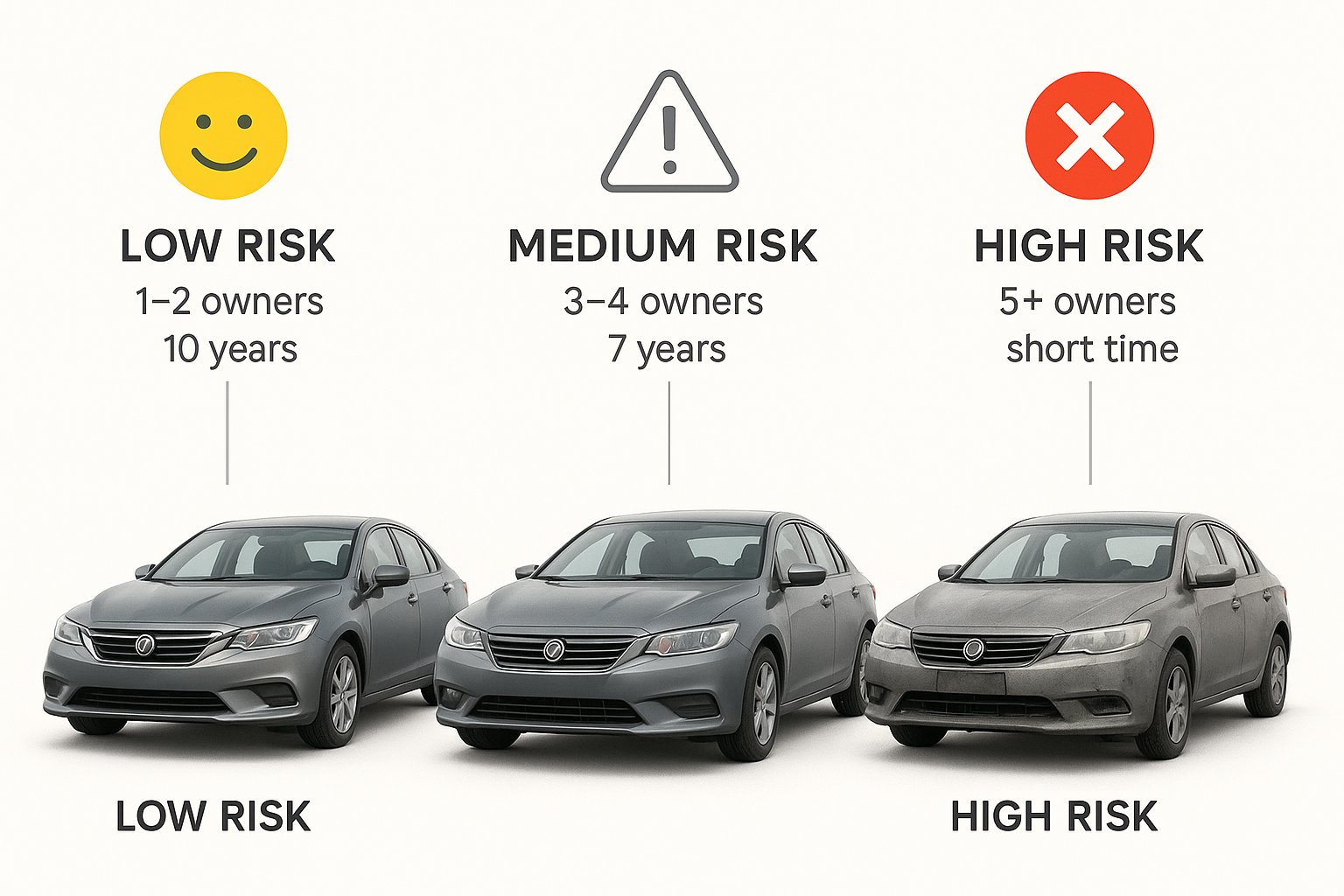
When reviewing a previous owner VIN lookup, one of the most valuable insights is spotting patterns in how often the vehicle changed hands. A stable ownership record usually means the car was better cared for, while frequent changes of ownership can indicate hidden problems.
Here’s a simple comparison:
Ownership Pattern | What It Means | Buyer Risk Level |
|---|---|---|
1–2 Owners over 8–10 years | Consistent ownership, likely better maintenance, and a complete service history. | ✅ Low Risk |
3–4 Owners over 5–7 years | Normal for many used cars; check service records and title history for peace of mind. | ⚠️ Medium Risk |
5+ Owners over a short period (under 5 years) | Frequent transfers suggest possible hidden damage, mechanical issues, or quick resale flips. | ❌ High Risk |
A previous owner VIN search helps buyers quickly identify which category a vehicle falls into. While the report won’t show personal details due to privacy laws, it does provide the number of previous owners, transfer dates, and title history, giving you a clear picture of whether the car has a trustworthy background or a risky one.
VIN Owner Lookup Reddit – What People Are Saying
On Reddit, there are countless discussions where people ask if they can find the identity of a car owner for free using just the VIN number. The truth, as many community replies point out, is that you won’t get personal information because of privacy laws.
What you can find, however, are reliable ownership history details through proper VIN reports. Reddit users often mention that free tools are limited, while paid reports provide the real, legal, and accurate data. VINspectorAI stands out by offering these verified details at a lower cost than traditional services.
Why Use VINspectorAI for Owner Lookup?
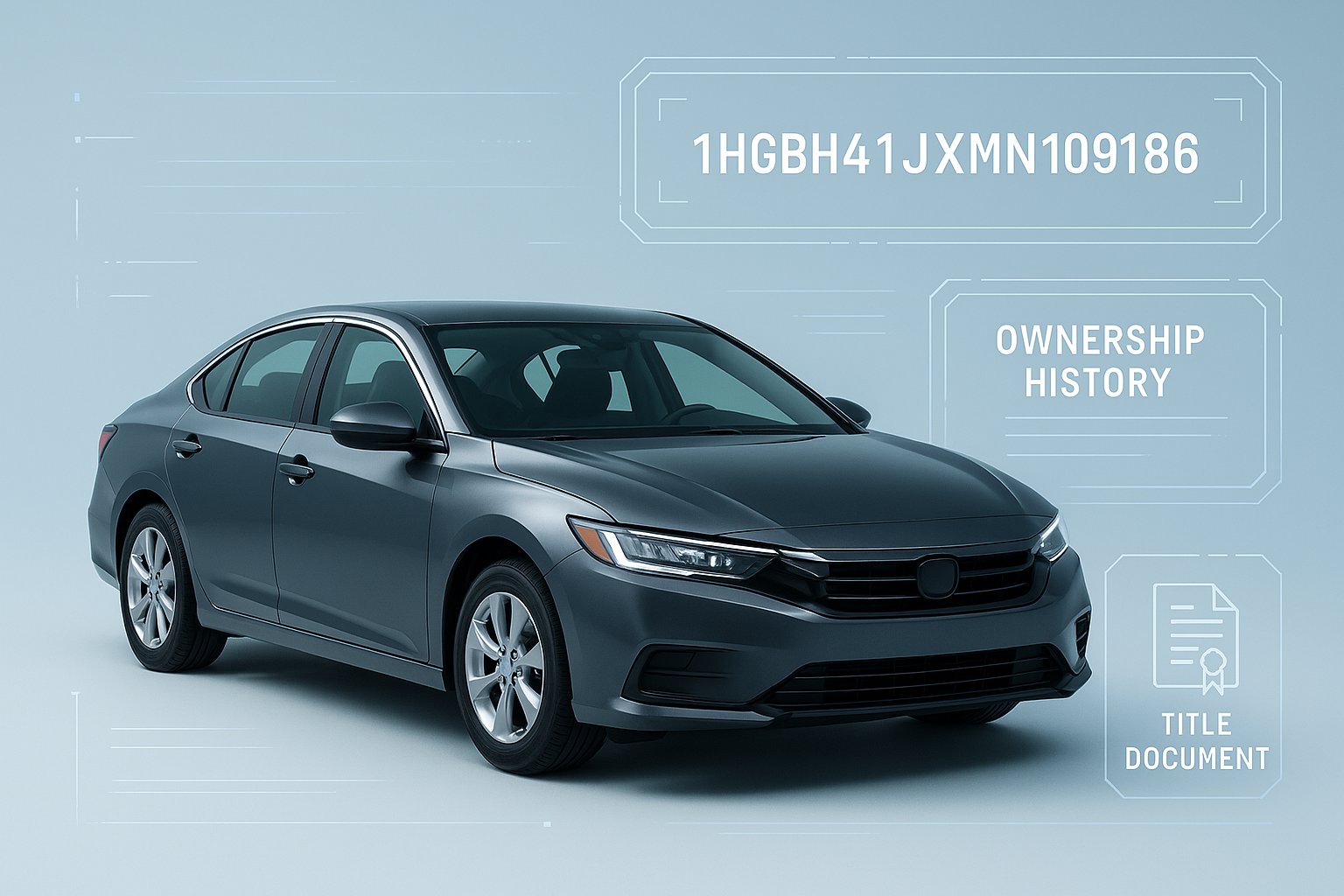
When it comes to checking a car’s ownership history, not all services are equal. VINspectorAI offers a smarter, AI-powered way to understand a vehicle’s past.
Feature | VINspectorAI Advantage |
|---|---|
Data Sources | Uses official data from DMV, NMVTIS, and insurance records |
Cost | More affordable than Carfax and other competitors |
AI-Powered Analysis | Detects odometer fraud, title washing, flood risk, and hidden issues |
Clarity | Interprets raw data with AI, making it easier to understand |
Decision Support | Helps you spot risks quickly and buy with confidence |
Instead of just showing raw data, VINspectorAI interprets the information for you, making it easier to spot risks and make the right decision before buying.
Conclusion: Why Every Used Car Buyer Needs an Owner VIN Lookup
A previous owner VIN lookup or general VIN owner search may not reveal personal details like names or addresses, but it does give buyers the information that truly matters. By uncovering the number of previous owners, the title history (clean, salvage, rebuilt), and even state-to-state transfers, you can spot risks early and avoid costly surprises.
Free VIN checks are useful for quick verification, but when investing thousands of dollars in a used car, only a detailed vehicle history report provides the confidence you need. That’s why smart buyers choose services like VINspectorAI — combining official DMV and NMVTIS records with AI-powered insights that highlight odometer fraud, title washing, flood risks, and hidden issues.
Check a VIN Now with VINspectorAI
Run a VIN owner lookup today and get the complete story behind any vehicle — fast, affordable, and powered by AI.
Frequently Asked Questions
Get answers to common questions about Owner VIN Lookup: How to Find Vehicle Ownership History free
Uncover Complete Vehicle History Reports
Discover critical vehicle information before you buy. Our VIN decoder reveals accident records, title status, recalls, and service history to help you make informed decisions.
Related Articles
More from Automotive Technology

Get a 100% free auto history check with VinspectorAI. No hidden fees. Uncover accidents, ownership, theft & more. Test our full AI analysis with a free demo!
Transparent VIN checks build trust in auto sales. Give buyers clear vehicle history reports & integrate checks for confident, informed car purchases.
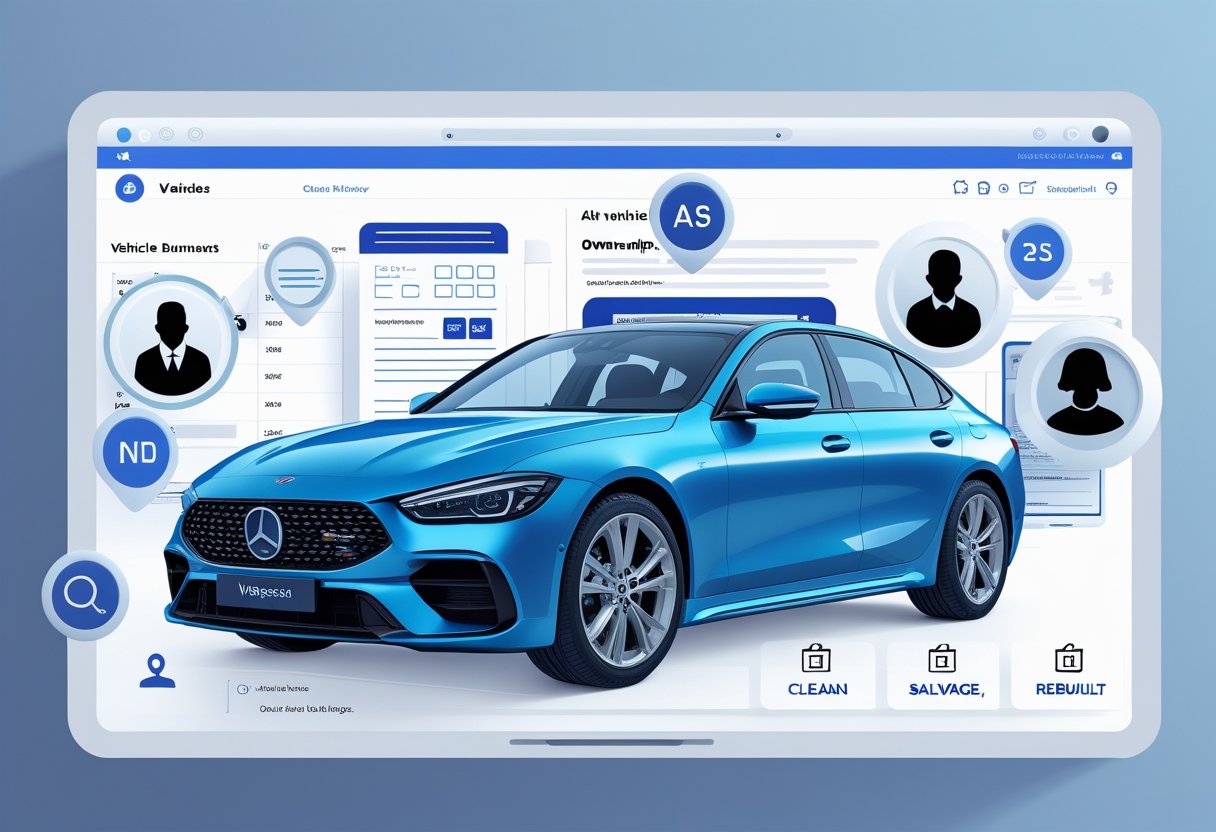
VINspectorAI uses AI to uncover accidents, fraud, recalls & true value — ensuring safe, smart purchases. Why You Should Check a Car’s, check now with vinspectorai.
